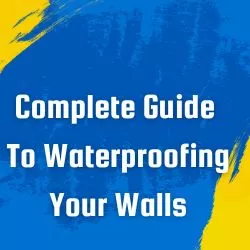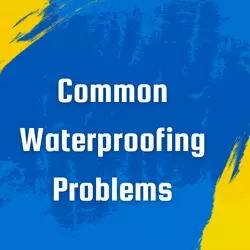The Complete Guide To Waterproofing Your Walls
Waterproofing Your Walls – All You Need To Know
For a house to appear more attractive, it must be free of dampness, mold, mildew, and germs that may make it appear unsightly. You may be able to achieve this goal easily by applying for a waterproofing solution for your walls. You may notice that when you paint your walls, they appear healthier than before. But how do you ensure that these healthy walls remain healthy for a long period of time?
While most people are aware that wall waterproofing is necessary, they do not know why it is necessary, how it works, when it should be performed, or what the best options are. Moreover, many of them do not understand the importance of professional assistance. There are many things you need to know when it comes to waterproofing walls, and the following guide will cover everything you need to know.
Signs You Should Waterproof Your Walls
Listed below are some of the crucial signs that you should consult an expert immediately and begin waterproofing your walls.
- There is a musty smell in your home
- Mold is visible on the surface
- Water stains can be seen on your walls and ceiling
- Paint or wallpaper is peeling in some areas
- You have cracks in your walls
- There is a bowing in your walls
What Is The Best Time To Waterproof Your Walls?
It is important to waterproof your walls if you notice peeling paint, bubbles, or cracks. In spite of this, waterproofing is most advantageous when it is done during the construction process as this minimizes damage and the cost of repairing problems, should they occur. Over time, maintenance will be required.
Whenever a building is renovated or repaired, waterproofing is performed by applying impermeable coatings and cement board backings to prevent water from entering. However, during the construction process, a concrete mixture containing liquid waterproofing compounds is prepared. This mixture reduces and absorbs moisture during construction.
When it comes to waterproofing walls after years of construction, you should always consult with an expert first if you are unsure how to go about it. As soon as the experts determine what is causing the problem, they will take the appropriate steps to resolve it. It is also advisable to inspect the walls for peeling, bubbling, and a variety of other problems before applying waterproofing solutions.
No matter what the issue is, whether it is seepage or cracked walls, we have a solution to suit your needs. You can rest assured that when you choose Sterling Technotrade’s waterproofing solutions, only the best products and techniques will be used to achieve the best results.
Benefits of Waterproofing Your Home Walls
- Concrete walls are less likely to develop cracks.
- Keeping the walls free from seepage.
- Your home will require less maintenance.
- Walls are less likely to corrode.
- An increase in the resale value of your property.
- Providing a healthy environment for the occupants.
How Can You Waterproof Your Walls?
A house that is waterproof ensures that it is hygienic and attractive from the inside as well as the outside. To understand how wall waterproofing works, let us take a look at how the process is carried out.
1. Identify The Problem
The first step is to identify walls that are constantly exposed to rainwater. Finding a problem may be challenging and take quite some time, which is why you should consult with Sterling Technotrade’s waterproofing experts. Our waterproofing expert will inspect the walls on-site in order to determine the cause of the leak and moisture in the walls. Upon assessing damage caused by seepage and the problems caused by it, they will determine the most suitable waterproofing solution.
2. Eliminate The Source Of Dampness
Moisture in walls is not always caused by rain or seepage, but by other factors such as faulty pipes and cracks in the exterior walls. Any cracks should be filled with superior quality fillers and putty to prevent further damage. It is imperative to replace or repair leaking pipes as soon as possible.
3. Prepare Waterproofing Surface
The surface should be smoothed before waterproofing and any leaks or seepage should be repaired. When the surface is prepared prior to waterproofing, it will be easier for the waterproofing solution to adhere to the surface and provide the best results.
4. Using Waterproofing Solutions
In order to make sure that walls, plaster, and mortar are free of moisture, Plaster Work Services should be performed before painting. Moreover, you can choose from three methods for applying the waterproofing solution to the walls: roller, brush, or spray application.
How Does Sterling Technotrade Waterproof Walls?
As part of our waterproofing services, our waterproofing experts use all the correct techniques to waterproof your walls. To prevent the spread of infection, all safety protocols are followed by all members of the team.
Should you require wall waterproofing services in India, we would be happy to assist you. Call us at any time or click on the button below if you have any questions.





